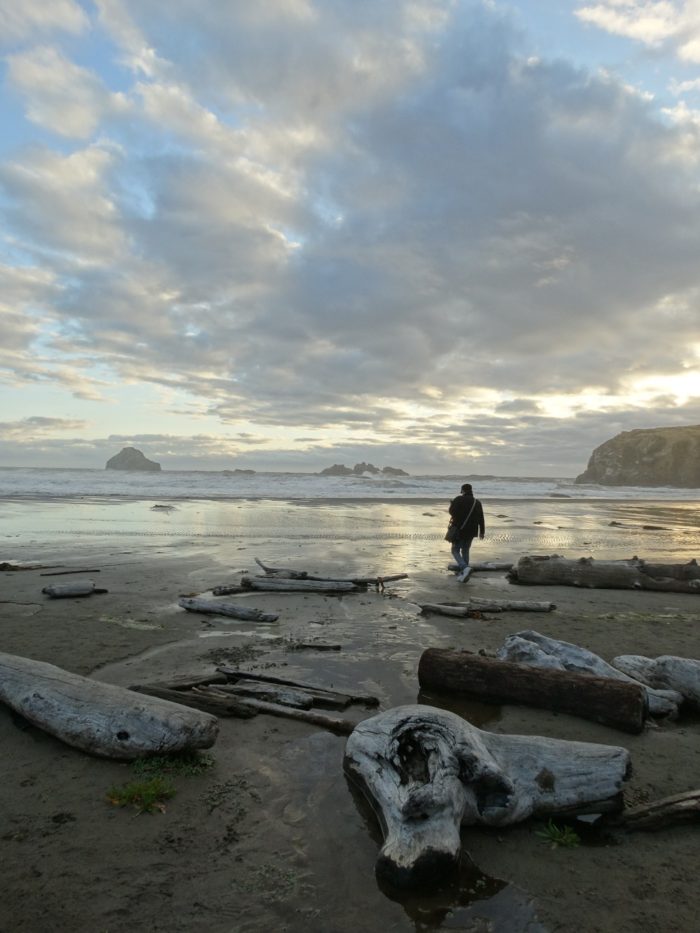I love going to the Oregon coast. love the power and beauty and sense of God’s creative genius that surrounds me when I’m there. Ever since I was little, I’ve looked on the ocean as a friend, even played tag with the water as it came in, daring it to wash over my bare feet, running when it got close, laughing when it caught me. (Yes, I still do this.) Recently, though, while at the coast, I was struck by the fact that not everyone experiences the coast the same way. I know, an obvious thing, but it just never occurred to me before. Some of the folks walking the beaches did so with knee-high boots, willing to let the surf catch them but clearly not wanting to get their feet wet. Others walked high up on the beach, removing any chance of being touched by the salty water. Some walked with brisk steps, as though they were focused on a goal, maybe not even seeing the beauty around them. Others ambled, leaning down to pick up various treasures and slip them into a pocket or bag. Still others didn’t walk at all. They just sat, some in chairs they’d brought, others on driftwood logs.
As I took all this in, I thought about the challenge of writing about the ocean. About sharing my experience of it in a way that can impact readers who don’t view the ocean as I do. And then, as I’m sure you’ve guessed, my thoughts turned to writing about God. My experience of God is colored by my experience of my parents and their love for Him. Because I experienced my parents as loving and tender and just awe-inspiring, I have no trouble seeing and experiencing God in that way as well. All that is good and true and just in God was lived out for me, day by day, in my precious Mom and Dad. And while there are those who share that experience of God with me, just as many—probably even more—don’t.
So the challenge for us as we write, then, is this: how do we write about God, about living for Him and growing in our knowledge of and faith in Him, about loving and trusting in Him, in such a way that reveals Him to those with differing views or experiences? How do we show who God is in ways that will speak even to those who have very different experiences from ours? Is it even possible?
What do you think?



 Writing from Weakness
Writing from Weakness

An amazing and thought provoking question Karen, and one that I think we could spend a lifetime trying to answer. And truly I’m not sure there is one particular pat answer to that. We can offer our perspective and experience, try to draw the reader in with the beauty of God … whatever that means for us individually, and hope to entice them enough with the wonder that we show to step out and discover for themselves who God is. I think people’s experience of God is as varied as the people he has created. I see God through nature, and through art, and in the midst of story, but others may see Him through provision, or study, or means that are less “beautiful” I think that is why the writers voices are so varied and our tribes so diverse. Looking for those who respond to the way you present His reality is the key to reaching those who will benefit from your experiences. …and that is a beautiful thing!
By first living it, experiencing what it is to be in the world, but not of it. Even when we’re writing fiction, we draw from experiences and point of views that are unique to who we are and to how God has allowed us to live life.
I am currently in a place where most of the people that surround me do not see the way I see. Even those I work with, who are children – and warriors – of God, take different stances in a lot of issues as I do. He has taught me to celebrate who they are, while not being tolerant of the things about them that displeases God, because not only does He want me to love them, they also make for great fiction. Lol. They show me perspectives I wouldn’t otherwise understand.
And I realize that life is beautiful, even when surrounded by the messy grit of everyday, regular people, who may not fully realize how much God shines through them.
If we can’t see and show God in the way we live, we won’t be able to do it in the way we write. I think, as a writer, that challenges not only my craft/art, but also my way of life.
I think Patrick Carr did it well in the two books of his Darkwater series. I recently read the first and the second (as yet unpublished) which I will be reviewing. He placed different characters in situations where they realized the limitations of their own gifts, talents, and abilities. It’s at times like those were we see how God works. We need to look for God’s hand everywhere in the present, the past and as we approach the future. Our characters need to look as well. We also need to accept both good and bad as coming from his hand to work his purposes. And yes, I know this is a plug for an author you represent, but it’s rare for me to read a work of fiction that makes me ponder the issues presented and keep thinking about them even after I have finished the book.
Karen, you touched on an issue that sometimes bothers me. You speak of how you could relate to God’s love for you because you experienced a glimpse of that through your parent’s love for you. How do we explain this thing to those with different experiences, you ask. And believe me, there are MANY who have never even had that glimpse.
I’ve often been troubled when pastors compare God to a person’s parents, saying things like, “Your father would never harm you. Likewise, your Father in heaven won’t.” Because, having worked as a counselor with families in destitute and drug-infested areas, I’ve met many people who, if you liken God to their father, will see Him as selfish, abusive, malicious, and/or just plain gone. I have since worked in the Christian counseling field, and sadly, that pattern is not as diminished as we’d like to hope. So your point to write for people who have different experiences than us is an important one.
This is one of the reasons I love to write fiction rather than non-fiction. I’m able to share the experience of God through many points-of-view, hopefully touching on one THAT reader can relate to. But as you say, we need to go beyond our own experience and view Him through others so we can touch them in a way they’ve never been touched before.
How do we do this, you ask. We listen!!! We listen to people around us. We ask interested and open-ended questions. We don’t assume we know the answers to the questions. We let them surprise us with their story. And we never judge who they are at the core because they’ve made some bad mistakes along the way. We find out what drove them to make that mistake, and help them find restoration through Christ. That’s the story we’ll tell. Their story! It’s a great story, because it’s about a powerful God who can turn our dirtiest muck into something beautiful.
Connie, I’m so glad you’re using fiction to show how God acts in real life. I just finished “At the Edge of a Dark Forrest,” and I loved it as a beautiful story of transformation! I’ve known some Becketts, and they are bright lights flaming in the darkness.
Thank you, Karen, for acknowledging those who have not been raised in a “Waltons” kind of family. Some people have been raised in homes that appeared normal and kind on the outside, but on the inside parental narcissism permeated the nest. When someone from a home like this reads about lovely families, a deep sadness can settle in if this person hasn’t worked through the grief of the past. I think a novel can help a reader by showing them both kinds of families. In doing so the reader will feel validated and also be given hope that their own new family can follow a healthier pattern as they learn from the good example in the story. The more people I get to know, the more brokenness I discover hidden behind polite smiles. It’s not politically correct to talk about things like maternal narcissism, but it exists. Fiction can bring it to the surface in an empathetic way that points to forgiveness and healing hope as the reader is shown how to walk through the grief, acceptance, and setting up of personal boundaries.
Blessings ~ Wendy
Very well said, Wendy. I experienced a very non-Waltons childhood. Almost everything you can think of was part of my growing up experience. I came to Jesus in 1973 but it was many many years before I could call him Father. And still sometimes there’s a slight cringe. I almost always refer to him as Heavenly Father or Abba. But my experience is you can eventually get over the hurdle. I praise God for his “binding up our wounds and mending our broken hearts.” Something that has helped me immensely is seeing how my husband father-ed…so kind, gentle, etc. Not perfect, but not abusive. And now seeing my sons and son-in-law parent. It just fills my heart with love for my Heaven;y Father, and makes me feel loved by him.
Blessings Diana
Thank you, dear Diana. “Seeing” love in ways a broken person hasn’t witnessed before does indeed “fill hearts with love for the Heavenly Father”. It’s a reason why it’s wise for healthy families to share hospitality with the lonely ones they see in church. I’ve recently felt a tug to reach out to someone. May God grant me the courage to do so. Blessings. 🙂
Oh, and to address the thread, I really like to see fiction [and write it] that reflects that having a very unperfect parent, to the [point of abusive. It has helped me to see that there are good parents out there, there is forgiveness, and sometimes reconciliation [I actually appreciate Christian fiction that shows forgiveness but not reconciliation because the parent is still abusive verbally or even physically.] But I know that through God all things are possible and I’ve seen even really stubborn people do a 180 and follow Jesus 🙂
I’ve chose (felt called, actually) to write about God’s transforming power during Roman times as a parallel to what is happening today. They are stories of love and spiritual transformation where a main character is saved through the love of a Christian who showed the MC that following Jesus was worth any sacrifice, inspiring the MC to find God as well.
Most of us in the US don’t have to worry much about whether staying true to Jesus will get us killed, but my characters are like people in parts of today’s world where they do. What I’m hoping to share is how great the temptation can be to set earthly desires above heavenly loyalties. They also show how resisting can seem for a while to cost too much, but in the end it’s worth it.
My dad was wonderful, but loving God because of what Jesus did for me doesn’t depend on how I feel about my own father. Perhaps it doesn’t for others as well.
Great thoughts. Familiar images and experiences mean vastly different things to different people.
For example, I too used to enjoy visiting the ocean. (In fact, I was born in a city called “Oceanside.”)
I enjoyed it all the way until I learned about tsunamis. And rogue waves. Rip tides were already a frightening enough invisible threat.
Today I live in the Puget Sound area, wondering whether the overdue slip of the Cascadia Fault will occur in the next twenty to thirty years.
When the heart choses to serve HIM there is nothing that can be asked that will not be given. When the mind accepts the truth then peace is given in abundance. I served HIM and I am not forgotten. I have asked HIM and has answered my plea. I walk with peace knowing that HE walks with me.
Lovely posting, Karen. I think that we write about God to people of various backgrounds by demonstrating His power to change the lives of our characters. How does He sustain them through trials? How do they seek His will in their lives? How does faith in God, without going into denominational viewpoints, change the way they make it through the story to become better than they were before? That’s how I am writing in in my fiction book right now. My main character is fighting the challenges of being a single parent, re-marrying a man who turns out to be unfaithful, and how she copes and comes through it with stronger faith than before.
Hi, Karen!
I’ve tried to write my experience of God through dramatic novels that allow for both non-Christian and Christian readers. I like your description of the ocean: I’ve used this very metaphor a lot in my expression of spirituality. I live in NZ, so we’re surrounded by ocean.
My novel is free for all formats on Smashwords: http://www.smashwords.com, the novel is called A New Kind of Zeal (a play on New Zealand). I’ve created a kiwi expression of Jesus called Joshua, and then outworked the entire drama of the Gospel afresh set in 2030: an encounter with Jesus.
I think our humanity is a key point of connection, as was Jesus’s humanity.
I like your analogy, though: people do have very different perspectives in approaching the question, or answer, of God.
Thanks for asking the question! 🙂